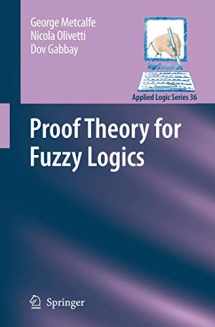
Proof Theory for Fuzzy Logics (Applied Logic Series, 36)
ISBN-13:
9781402094088
ISBN-10:
1402094086
Edition:
2009
Author:
Metcalfe
Publication date:
2008
Publisher:
Springer
Format:
Hardcover
288 pages
Category:
AI & Machine Learning
,
Algorithms
,
Programming
,
Logic & Language
,
Philosophy
,
Computer Science
FREE US shipping
Book details
ISBN-13:
9781402094088
ISBN-10:
1402094086
Edition:
2009
Author:
Metcalfe
Publication date:
2008
Publisher:
Springer
Format:
Hardcover
288 pages
Category:
AI & Machine Learning
,
Algorithms
,
Programming
,
Logic & Language
,
Philosophy
,
Computer Science
Summary
Proof Theory for Fuzzy Logics (Applied Logic Series, 36) (ISBN-13: 9781402094088 and ISBN-10: 1402094086), written by authors
Metcalfe, was published by Springer in 2008.
With an overall rating of 3.6 stars, it's a notable title among other
AI & Machine Learning
(Algorithms, Programming, Logic & Language, Philosophy, Computer Science) books. You can easily purchase or rent Proof Theory for Fuzzy Logics (Applied Logic Series, 36) (Hardcover) from BooksRun,
along with many other new and used
AI & Machine Learning
books
and textbooks.
And, if you're looking to sell your copy, our current buyback offer is $0.3.
Description
Fuzzy logics are many-valued logics that are well suited to reasoning in the context of vagueness. They provide the basis for the wider field of Fuzzy Logic, encompassing diverse areas such as fuzzy control, fuzzy databases, and fuzzy mathematics. This book provides an accessible and up-to-date introduction to this fast-growing and increasingly popular area. It focuses in particular on the development and applications of "proof-theoretic" presentations of fuzzy logics; the result of more than ten years of intensive work by researchers in the area, including the authors. In addition to providing alternative elegant presentations of fuzzy logics, proof-theoretic methods are useful for addressing theoretical problems (including key standard completeness results) and developing efficient deduction and decision algorithms. Proof-theoretic presentations also place fuzzy logics in the broader landscape of non-classical logics, revealing deep relations with other logics studied in Computer Science, Mathematics, and Philosophy. The book builds methodically from the semantic origins of fuzzy logics to proof-theoretic presentations such as Hilbert and Gentzen systems, introducing both theoretical and practical applications of these presentations.


We would LOVE it if you could help us and other readers by reviewing the book
Book review

Congratulations! We have received your book review.
{user}
{createdAt}
by {truncated_author}


